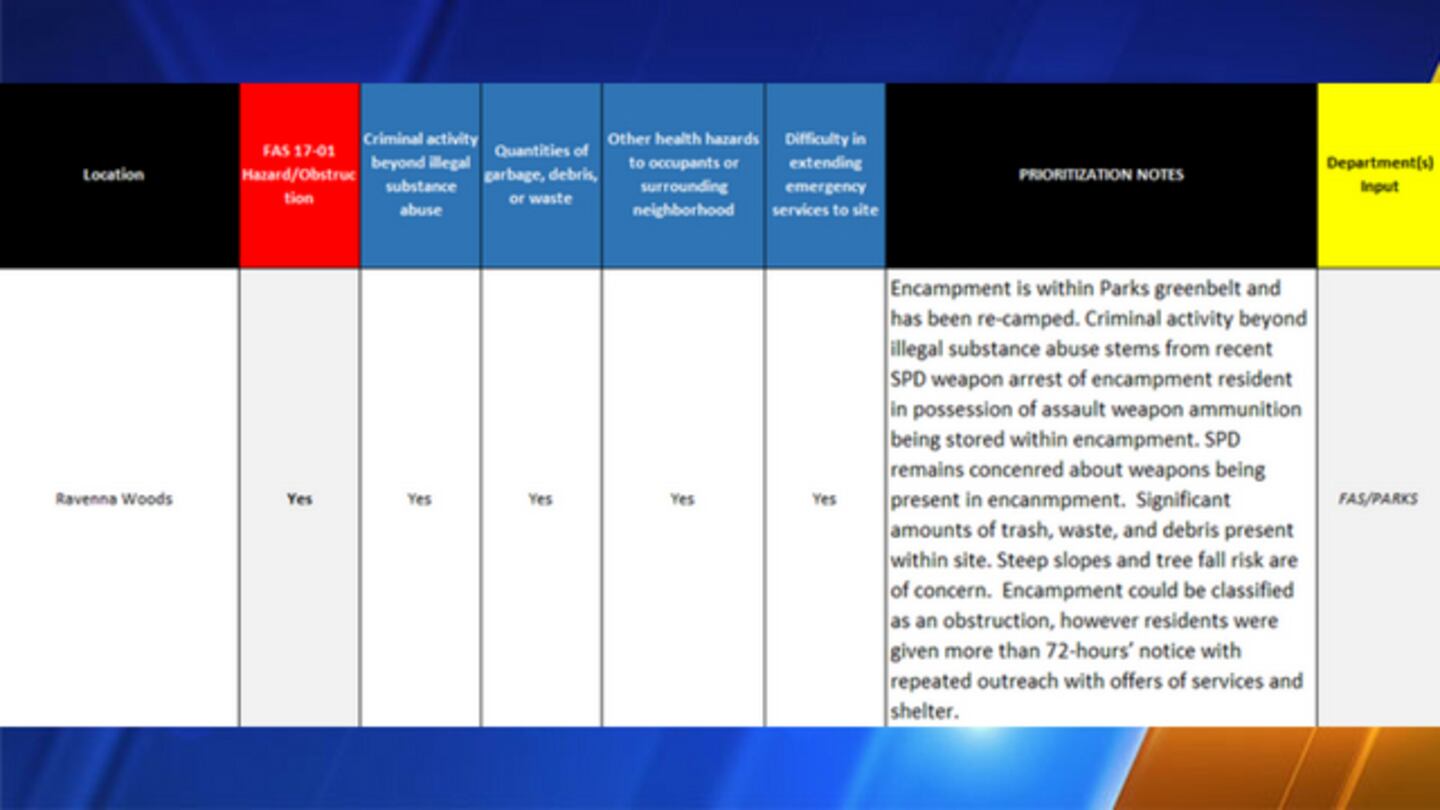SEATTLE — A stand-off between Seattle’s Navigation Team and activists led to tense moments during an unsanctioned homeless camp cleanup in the Ravenna Woods in April.
Protestors blocked a garbage truck from going into the area to pick up waste and debris. The city’s Navigation Team scheduled the cleanup after a felon living in the camp was arrested with 30 rounds of assault rifle ammunition, brass knuckles and several large knives.
The protest forced some of the workers to delay their work until the following day.
>> Handling Seattle's illegal homeless encampments: From complaint to outreach to clean up
Immediately following the cleanup, questions were raised about how activists had known about it, since the city does not publish the schedule ahead of time.
Each week, the Navigation Team is required by the City Council to send a list of potential sites for upcoming cleanups and the reasons for those cleanups to council members.
KIRO 7 filed a public disclosure request and obtained emails that reveal that aides in Sawant’s office, and sometimes Sawant herself, are forwarding the cleanup lists to community activists, including those behind the protest at the cleanup in April. (Click to enlarge image)
The activist who received forwarded information about the Ravenna Woods cleanup tweeted the night before:
That list has been forwarded to members of the public at least 10 times since the beginning of the year.
Sawant has been an outspoken critic of the unsanctioned camp cleanups, saying they violate the rights of those who have nowhere else to go.
Cleanups are currently done following strict guidelines laid out by city leaders, which include requiring multiple visits from outreach workers to offer shelter and services. KIRO 7 recently joined the Navigation Team to get an in-depth look at how unsanctioned camps are chosen for cleanup, whether due to hazards that threaten the campers or the public.
Sawant’s office released the following statement in response to this story:
"The schedule of the Mayor’s sweeps of homeless encampments is public information, but the Mayor’s office makes it difficult for members of the public to access the information. We reject the idea that there has been any “leak.”
"The Mayor’s office should not be carrying out the inhumane sweeps in the first place, but it is injustice on top of injustice that community members have to jump through hoops - being forced to go through the arduous and time-consuming process of a public records request - to even get information of planned sweeps. In the absence of the Mayor’s office providing easy access to this public information, my office shares it so that community members can have their voices heard - whether that is protesting and halting the sweeps or observing the sweeps to watch for abuses or breaking of stated department policies."
***It should be noted that the City Council could require the list of upcoming cleanups be made available to the general public at any time. There is currently no rule in place that prevents it.
Sawant’s statement continued:
"Sweeps of homeless encampments are proven - by years of data - to be both ineffective and inhumane. Rather than spend millions of public dollars on sweeps, the City should be acting to tax big business to fund social housing - publicly funded permanently affordable housing - and to get the state legislature to lift the ban on rent control. But as the capitulation and betrayal of the City Council with the Amazon Tax repeal shows, working people will need to build independent mass movements and not rely on corporate politicians."
Will Lemke, a spokesperson for the Navigation Team, released this statement:
“The weekly encampment report is required by City Council, which can be found here. The Executive has been providing this report since January 1, 2018. The Navigation Team's primary concern is to build relationships that can help move extremely vulnerable people from unsafe encampments into safer spaces, where they can receive the critical support and services they need to find a path to permanent housing. Most of the team's work is conducting this kind of intensive outreach to services. The team's work to remove the most unsafe encampments follows the City protocols requiring advanced outreach, offers of shelter and services, and storage of valuables during encampment removals. The Navigation Team works across Seattle every day within the public's view.”
Cox Media Group








